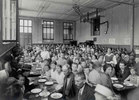
Unternavigation
Like all European counties at the outbreak of the First World War, Switzerland only expected a short engagement. No socio-political measures were taken to counter the rampant inflation for a long time. Neither was there compensation of loss of pay for soldiers nor price controls. It was not until the final two years of the war that authorities began rationing basic food such as milk and bread. The Federal Council also softened the Factory Act and ordered wage freezes in public enterprises. The results were losses of real earnings ranging from 25 to 30 percent as well as shortages in food and housing. In the summer of 1918, official statistics indicated 692,000 people – around one sixth of the population – were in need of emergency aid. These figures were even higher in cities. The already weakened population was then hit by the Spanish flu in autumn 1918 which claimed almost 25,000 lives – or 0.6 percent of the population by 1920.
Emergency measures were implemented primarily by the cantons and municipalities. Often in cooperation with non-profit women’s associations, they set up soup kitchens and workers’ shelters, and handed out food. The Confederation chiefly supported unemployment welfare. It predicted a rise in unemployment and therefore established a welfare fund in 1917 that was funded through war taxes. The Confederation worked with municipalities and employers to support people who had become unemployed through no fault of their own. In addition, the Confederation subsidized existing unemployment funds, often set up by the unions, and alleviated the tax burden for private pension schemes.
The worsening social situation brought about a polarization in domestic politics as well as protests and strikes. These developments culminated in the National General Strike in November 1918. The Olten action committee, which coordinated the workers’ movement, primarily demanded social policies, namely: women’s right to vote, the 48-hour week, the safeguarding of food supply and the introduction of an old age and disability insurance which had been stalled at the political level since 1912.
Literatur / Bibliographie / Bibliografia / References: Tabin Jean-Pierre et al. (2010 [2008]), Temps d’assistance. L’assistance publique en Suisse romande de la fin du XIXe siècle à nos jours, Lausanne.
(12/2014)




